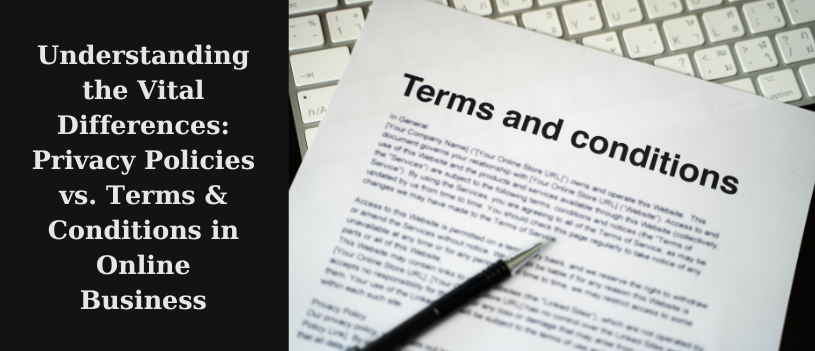In the contemporary business landscape, online interactions have become the norm, necessitating a clear understanding of the distinct roles of Privacy Policies and Terms & Conditions. These two key documents are crucial for legal compliance and fostering positive relationships with customers.
Privacy Policy: Safeguarding User Data
A Privacy Policy, also known as a privacy statement or notice, serves as a detailed disclosure of how your business intends to use personal data collected through websites or mobile apps. It functions as a legally binding agreement, ensuring the protection of both business interests and individuals providing their information.
Key Functions:
- Data Practices: Outlines how user data is collected, used, and protected.
- Trust Building: Establishes transparency, building trust with users.
- Legal Compliance: Ensures adherence to data protection laws like GDPR, CalOPPA, COPPA, HIPAA, or CCPA, depending on user locations.
- Third-Party Requirements: Often required by third-party apps and services for a protected user experience.
Importance:
- Legal Requirement: Compliance with evolving privacy laws is mandatory.
- Trust-Building: Enhances user confidence and can turn customers into brand ambassadors.
Terms & Conditions: Defining User-Business Relationship
Terms & Conditions articulate the rules governing the user-business relationship, setting expectations for user behavior, dispute resolution, and liability. These terms establish a digital contract with users, addressing aspects such as user responsibilities, dispute procedures, liability limitations, and conditions for user access termination.
Key Components:
- User Responsibilities: Defines user behavior expectations.
- Dispute Resolution: Outlines procedures for handling disputes.
- Liability Limits: Specifies conditions for limiting business liability, especially during service interruptions.
Importance:
- Legal Protection: Defines rules for service use, protecting the business legally.
- User Expectations: Sets clear expectations for user behavior and responsibilities.
The Crucial Role of Both Documents
Privacy Policies and Terms & Conditions play distinct roles, offering legal compliance, transparency, and a framework for positive user experiences. While Privacy Policies ensure responsible data handling and legal compliance, Terms & Conditions protect businesses by defining user expectations and relationships.
Why Both Are Essential:
- Legal Compliance: Ensures adherence to applicable laws and regulations.
- User Trust: Builds transparency and fosters trust with customers.
- Business Protection: Provides legal protection by defining user-business relationships.
To safeguard your business and users, it’s crucial to craft comprehensive and easily understandable Privacy Policies and Terms & Conditions. These documents reflect your commitment to responsible data handling, user privacy, and legal integrity in the digital sphere. For expert guidance, consider reaching out to your attorney for assistance. If you do not have one, call Chase Law Group for a consultation at 310-545-7700 or visit their website at www.chaselawmb.com.
Chase Law Group (chaselawmb.com)
